i have an understanding problem how boost asio handles this:

When I watch my request response on client side, I can use following boost example Example
But I don't understand what happens if the server send every X ms some status information to the client. Have I open a serperate socket for this or can my client difference which is the request, response and the cycleMessage ?
Can it happen, that the client send a Request and read is as cycleMessage? Because he is also waiting for async_read because of this Message?
class TcpConnectionServer : public boost::enable_shared_from_this<TcpConnectionServer>
{
public:
typedef boost::shared_ptr<TcpConnectionServer> pointer;
static pointer create(boost::asio::io_service& io_service)
{
return pointer(new TcpConnectionServer(io_service));
}
boost::asio::ip::tcp::socket& socket()
{
return m_socket;
}
void Start()
{
SendCycleMessage();
boost::asio::async_read(
m_socket, boost::asio::buffer(m_data, m_dataSize),
boost::bind(&TcpConnectionServer::handle_read_data, shared_from_this(), boost::asio::placeholders::error));
}
private:
TcpConnectionServer(boost::asio::io_service& io_service)
: m_socket(io_service),m_cycleUpdateRate(io_service,boost::posix_time::seconds(1))
{
}
void handle_read_data(const boost::system::error_code& error_code)
{
if (!error_code)
{
std::string answer=doSomeThingWithData(m_data);
writeImpl(answer);
boost::asio::async_read(
m_socket, boost::asio::buffer(m_data, m_dataSize),
boost::bind(&TcpConnectionServer::handle_read_data, shared_from_this(), boost::asio::placeholders::error));
}
else
{
std::cout << error_code.message() << "ERROR DELETE READ \n";
// delete this;
}
}
void SendCycleMessage()
{
std::string data = "some usefull data";
writeImpl(data);
m_cycleUpdateRate.expires_from_now(boost::posix_time::seconds(1));
m_cycleUpdateRate.async_wait(boost::bind(&TcpConnectionServer::SendTracedParameter,this));
}
void writeImpl(const std::string& message)
{
m_messageOutputQueue.push_back(message);
if (m_messageOutputQueue.size() > 1)
{
// outstanding async_write
return;
}
this->write();
}
void write()
{
m_message = m_messageOutputQueue[0];
boost::asio::async_write(
m_socket,
boost::asio::buffer(m_message),
boost::bind(&TcpConnectionServer::writeHandler, this, boost::asio::placeholders::error,
boost::asio::placeholders::bytes_transferred));
}
void writeHandler(const boost::system::error_code& error, const size_t bytesTransferred)
{
m_messageOutputQueue.pop_front();
if (error)
{
std::cerr << "could not write: " << boost::system::system_error(error).what() << std::endl;
return;
}
if (!m_messageOutputQueue.empty())
{
// more messages to send
this->write();
}
}
boost::asio::ip::tcp::socket m_socket;
boost::asio::deadline_timer m_cycleUpdateRate;
std::string m_message;
const size_t m_sizeOfHeader = 5;
boost::array<char, 5> m_headerData;
std::vector<char> m_bodyData;
std::deque<std::string> m_messageOutputQueue;
};
With this implementation I will not need boost::asio::strand or? Because I will not modify the m_messageOutputQueue from an other thread.
But when I have on my client side an m_messageOutputQueue which i can access from an other thread on this point I will need strand? Because then i need the synchronization? Did I understand something wrong?